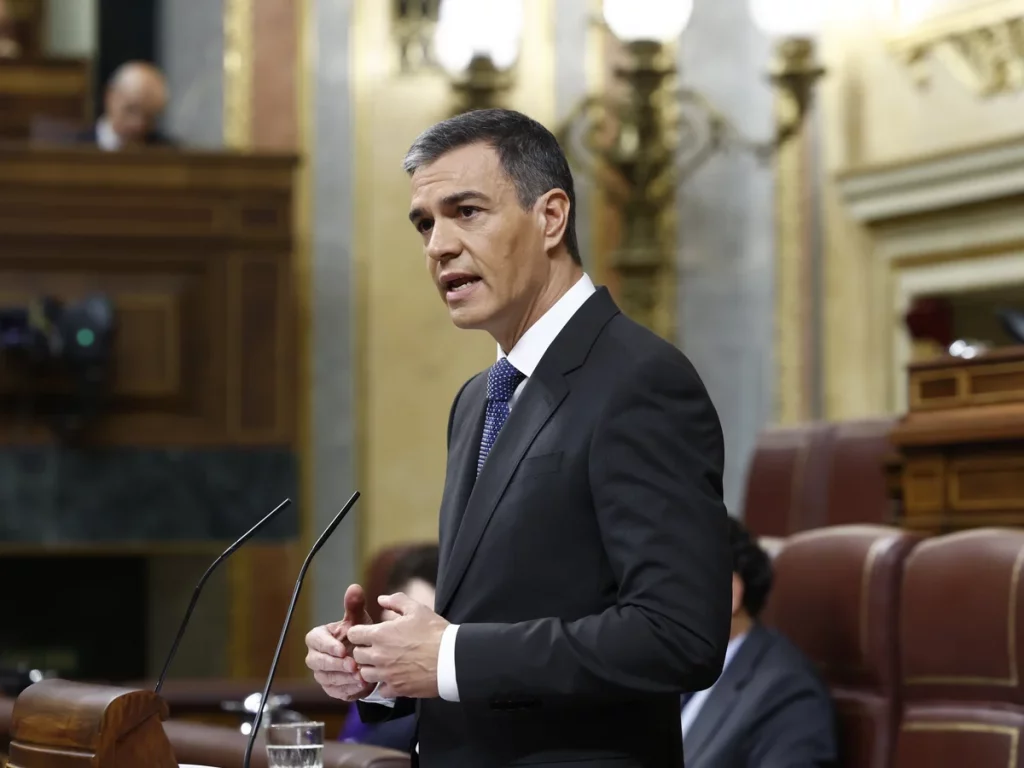With anti-immigration protests spreading across Spain and public opinion shifting toward stricter border control, Prime Minister Pedro Sánchez now faces mounting domestic pressure to harden his government’s migration stance. However, while other EU nations tighten policies, Spain stands apart—choosing a more moderate approach that has left the country politically isolated in Brussels.
Recent unrest in Torre Pacheco, a small farming town in southeastern Spain, highlighted growing tensions. The town witnessed five nights of violent clashes following the assault of an elderly person. Though misinformation and far-right mobilisation played a major role in fuelling the anger, the riots underscored a broader hardening of public attitudes toward migrants.
A recent survey conducted by Sigma Dos for El Mundo revealed that 70% of Spaniards support the deportation of migrants. Among centre-right Partido Popular (PP) supporters, this figure reached a staggering 91.7%, while even 57.1% of Sánchez’s Socialist Party (PSOE) voters expressed similar sentiments.
Despite the rising public discontent, Spain remains one of the few EU countries rejecting the bloc’s stricter migration policies. At a recent EU Home Affairs Council meeting in Copenhagen, Interior Minister Fernando Grande-Marlaska openly criticized the bloc’s proposed “return regulation,” which aims to establish asylum return hubs and ramp up deportations.
According to a government statement, Spain raised political, legal, and humanitarian concerns about these proposals, stating that large-scale deportations to third countries could pose serious risks. Madrid instead advocates for closer partnerships with migrant origin and transit countries like Mauritania, Mali, and Senegal—arguing that these agreements have already helped reduce irregular arrivals.
Spain reported a 42% drop in migrant arrivals to the Canary Islands during the first half of 2025, and a 27% decline in overall irregular entries, outpacing the EU average of 20%. Still, analysts warn this decline may not last. Xavier Aragall from the European Institute of the Mediterranean said the increased controls in North Africa are creating temporary barriers, but the migration flow is expected to rise again.
Despite a general drop in illegal border crossings, the Canary Islands remain the busiest migration route into Europe. Spain recorded 47,000 arrivals there in 2024, compared to 39,900 in 2023 and just over 15,600 in 2022. As access to the central Mediterranean narrows, more pressure is likely to fall on Spain’s western borders.
Madrid’s refusal to embrace the EU’s tougher stance has created a noticeable rift. Once aligned with other frontline states like Italy and Greece, Spain now stands alone. Aragall notes that Spain’s “solidarity-based approach” is isolating it in Brussels, making it harder to shape European migration policies.
Back home, Sánchez’s ruling coalition is deeply divided on migration. The left-wing Sumar party, which holds five ministries, has called for the legalisation of nearly 500,000 undocumented migrants. They strongly oppose the EU’s asylum return hubs, warning that such centres could violate humanitarian laws.
Support from parties like ERC and Bildu—who back the coalition—further complicates Sánchez’s ability to move rightward. On the other hand, regional nationalist groups like Junts and PNV are pushing for stricter migration enforcement, creating pressure from within the coalition.
A recent decision to redistribute 3,000 unaccompanied minors from the Canary Islands to other regions has sparked legal challenges. Six regions, including Madrid, Valencia, and Andalusia, have filed constitutional appeals against the decree. To make matters worse, Catalonia and the Basque Country—led by Sánchez’s political allies—are exempt from the program, leading to accusations of favouritism.
Sánchez now finds himself pulled in different directions. He’s resisting the EU’s rightward drift while navigating a fragile political alliance at home. Adopting tougher migration laws may calm domestic unrest, but it risks fracturing his coalition and undermining his government’s stability.

